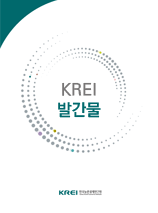
- Demand for Organic Farming Technology and Roadmap for Technology Development
-

-
Organic farming is a method of agricultural chemical․chemical fertilizer-free organic cultivation to produce agricultural products and to supply the produced agricultural products to consumers.
As more organic agricultural products are predicted to be produced thanks to the spreading wellbeing trend of consumers and government’s support policy, further development of organic farming technology is needed. Therefore, it is very important to identify the demands for organic farming technology, and to suggest a needed roadmap for developing technology, for the mid- and long-term agricultural policy.
The analysis of demands for organic farming technology for farmers in each field reveals high demands for using microorganisms and soil improvers in the field of soil and nutrient management technology. The field of weed control technology showed high demands for developing naturally decomposed vinyl products. The field of harmful insect control technology showed high demands for using organic materials, microorganisms and eelworms. The field of diseases control technology showed high demands for using natural materials and food, for example, egg yolk oil, vinegar, and pyroligneous liquid.
Organic farming experts said the highest priority of 0.219 for the technology of recycling crop cultivation and livestock resources including compost, liquid fertilizers and organic fertilizers in the investigation of applying the AHP method to analyze the priority of developing organic farming technology. The highest priority is followed by 0.125 for bio-agricultural chemical, and then 0.119 for the technology of cultivating green manure crops. It is necessary to develop a key project for each field of higher priority to input research funds for continuous technology development.
The development roadmap for each field is suggested in consideration of priorities of developing organic farming technology. In particular, required is to build a system for recycling crop cultivation and livestock farming by developing technology for organic crop cultivation and livestock recycling; a system for controlling eco-friendly organic farming soil and nutrients by developing technology for controlling organic soil and nutrients; a system for eco-friendly weed control by developing organic weed control technology; an eco-friendly system for controlling organic diseases and harmful insects by developing organic disease and harmful insect control technology; an eco-friendly system for organic seeds and seedlings by developing organic seed and seedling technology. It is essential to establish a technology development direction and the strategy for performance of each field for the R&D investment plan (2013-2022) in the agricultural sector.
Because it is predicted that organic farming will continue to develop as a field of future growth in agriculture, it is necessary to expand R&D investment in related technology development. It is necessary to adopt farmers’ and experts’ opinion to continue technology development to respond to demands in order to supply safe agricultural products to consumers by means of steady development of organic farming. -
목차
요약문
Organic farming is a method of agricultural chemical․chemical fertilizer-free organic cultivation to produce agricultural products and to supply the produced agricultural products to consumers.
As more organic agricultural products are predicted to be produced thanks to the spreading wellbeing trend of consumers and government’s support policy, further development of organic farming technology is needed. Therefore, it is very important to identify the demands for organic farming technology, and to suggest a needed roadmap for developing technology, for the mid- and long-term agricultural policy.
The analysis of demands for organic farming technology for farmers in each field reveals high demands for using microorganisms and soil improvers in the field of soil and nutrient management technology. The field of weed control technology showed high demands for developing naturally decomposed vinyl products. The field of harmful insect control technology showed high demands for using organic materials, microorganisms and eelworms. The field of diseases control technology showed high demands for using natural materials and food, for example, egg yolk oil, vinegar, and pyroligneous liquid.
Organic farming experts said the highest priority of 0.219 for the technology of recycling crop cultivation and livestock resources including compost, liquid fertilizers and organic fertilizers in the investigation of applying the AHP method to analyze the priority of developing organic farming technology. The highest priority is followed by 0.125 for bio-agricultural chemical, and then 0.119 for the technology of cultivating green manure crops. It is necessary to develop a key project for each field of higher priority to input research funds for continuous technology development.
The development roadmap for each field is suggested in consideration of priorities of developing organic farming technology. In particular, required is to build a system for recycling crop cultivation and livestock farming by developing technology for organic crop cultivation and livestock recycling; a system for controlling eco-friendly organic farming soil and nutrients by developing technology for controlling organic soil and nutrients; a system for eco-friendly weed control by developing organic weed control technology; an eco-friendly system for controlling organic diseases and harmful insects by developing organic disease and harmful insect control technology; an eco-friendly system for organic seeds and seedlings by developing organic seed and seedling technology. It is essential to establish a technology development direction and the strategy for performance of each field for the R&D investment plan (2013-2022) in the agricultural sector.
Because it is predicted that organic farming will continue to develop as a field of future growth in agriculture, it is necessary to expand R&D investment in related technology development. It is necessary to adopt farmers’ and experts’ opinion to continue technology development to respond to demands in order to supply safe agricultural products to consumers by means of steady development of organic farming.저자정보
저자에게 문의
구매안내
KREI의 출판물은 판매 대행사 (정부간행물판매센터)와 아래 서점에서 구입 하실 수 있습니다.
판매대행사
- (주)정부간행물판매센터http://www.gpcbooks.co.kr사이트 바로가기
- 서울특별시 중구태평로 1가 25번지
- TEL 02) 394-0337, 734-6818
- FAX 02) 394-0339
판매서점
판매서점 교보문고 http://www.kyobobook.co.kr/ 영풍문고 http://www.ypbooks.co.kr/ 알라딘 http://www.aladin.co.kr/ 활용도 정보
활용도 정보 상세정보 조회 좋아요 다운로드 스크랩 SNS공유 4316 0 10 0 0 -
- Suggestions to Promote the Hometown Love Donation System
- Gouk, Seungyong
- 2022.11.25
- KREI 이슈리포트
-
- Ten Years of Korea-U.S. FTA: focusing on agri-food trade
- Kim, Kyungphil
- 2022.06.09
- KREI 이슈리포트
-
- Impacts of Ukraine-Russia Conflict on Global Grain Prices
- Kim, Jongjin
- 2022.03.31
- KREI 이슈리포트
-
- The Impacts of the COVID-19 on the Korean Agricultural Market
- Seo, Hong-Seok
- 2020.06.05
- KREI 이슈리포트
-
- 10 Agricultural Policy Issues of Korea in 2019
- Jeong, Minkook
- 2019.01.29
- KREI 이슈리포트
-
- State of Korean and Overseas Markets for Environment-Friendly Agricultural Products and Challenges 2018
- Jeong, Hakkyun; Sung, Jaehoon; Lee, Hyeonjeong
- 2018.09.12
- KREI 이슈리포트
-
- Measures to Establish the Water-Energy-Food Nexus for Agricultural Resource Management
- Sung, Jaehoon; Cho, Wonju; Lee, Hyeonjeong
- 2018.09.05
- KREI 이슈리포트
-
- Changes in the Trade of Agricultural and Livestock Products and Implications after Seven Years from the Enforcement of the Korea-EU FTA
- Song, Woojin; Lee, Hyunkeun; Myeong, Suhwan; Yoo, Juyoung
- 2018.06.29
- KREI 이슈리포트
-
- 10 Agricultural Policy Issues of Korea in 2018
- Kim, Byoungryul
- 2018.01.22
- KREI 이슈리포트
-
- Income Changes by Type of Farm Household and Implications
- Woo, Byungjoon
- 2017.11.30
- KREI 이슈리포트
-
- Income Changes by Type of Farm Household and Implications
- Woo, Byungjoon
- 2017.11.30
- KREI 이슈리포트
-
- 10 Agricultural Policy Issues of Korea in 2019
- Jeong, Minkook
- 2019.01.29
- KREI 이슈리포트
-
- 10 Agricultural Policy Issues of Korea in 2018
- Kim, Byoungryul
- 2018.01.22
- KREI 이슈리포트
-
- Job Creation Potential for the Youth and Challenges in the Agricultural Industry
- Ma, Sangjin
- 2017.01.01
- KREI 이슈리포트
-
- Implementation Plan and Implications of International Development Cooperation Projects for Agriculture in 2017
- Heo, Jang
- 2017.04.28
- KREI 이슈리포트
-
- 2016 Production Status and Market Prospect of Eco-Friendly Agricultural Products at Home and Abroad
- Jeong, Hakkyun; Lee, Hyejin; Kim, Changgil
- 2016.11.30
- KREI 이슈리포트
-
- The Impacts of the COVID-19 on the Korean Agricultural Market
- Seo, Hong-Seok
- 2020.06.05
- KREI 이슈리포트
-
- Global Spread of Saemaul Undong for Rural Development in Developing Countries
- Heo, Jang; Lee, Yoonjung
- 2016.11.30
- KREI 이슈리포트
-
- Goals and Strategies to Reduce Greenhouse Gas Emissions in the Agriculture Sector
- Jeong, Hakkyun; Kim, Changgil
- 2015.11.03
- KREI 이슈리포트
-
- 70 Years' Achievements and New Challenges of Korean Agriculture and Rural Communities
- Song, Miryung; Moon, Hanpil; Kim, Meebok; Seong, Jooin; Lim, Jieun
- 2015.09.15
- KREI 이슈리포트
의견남기기


